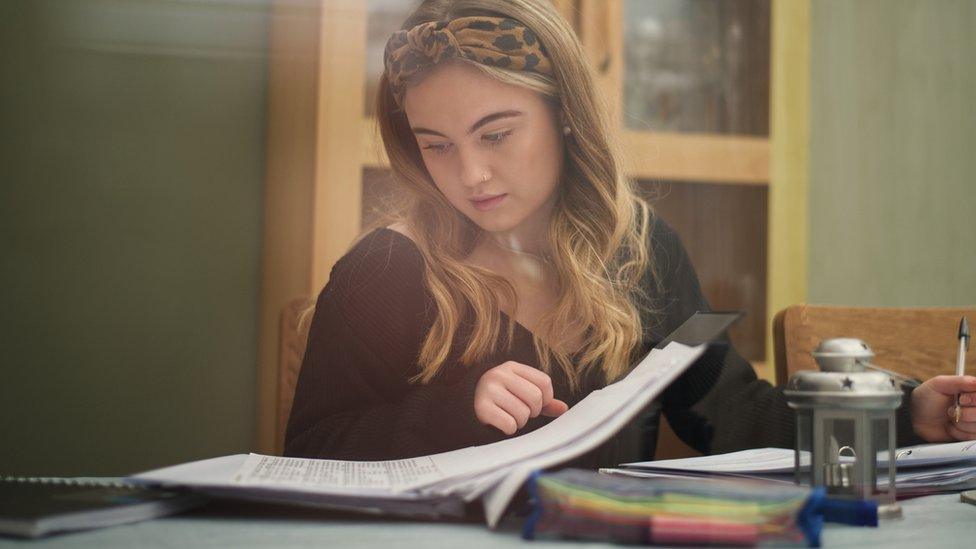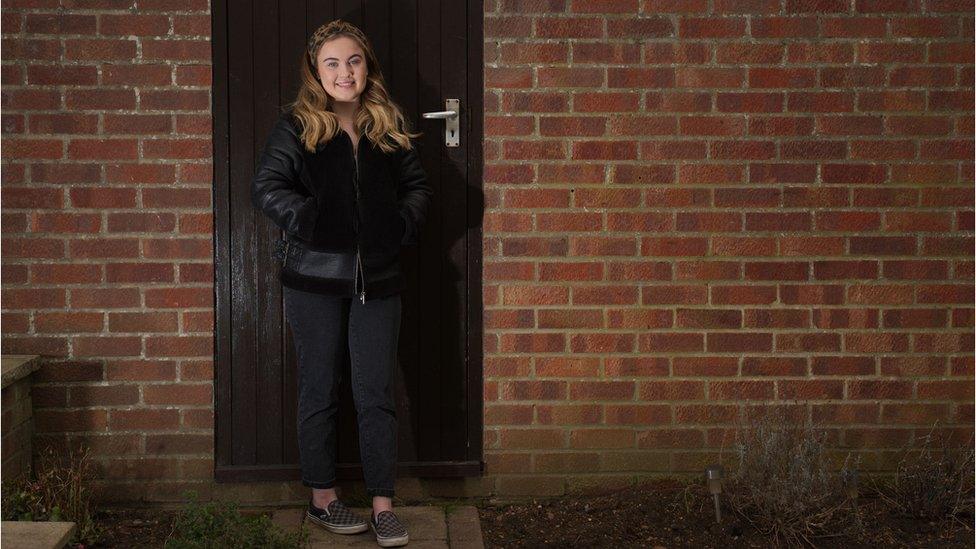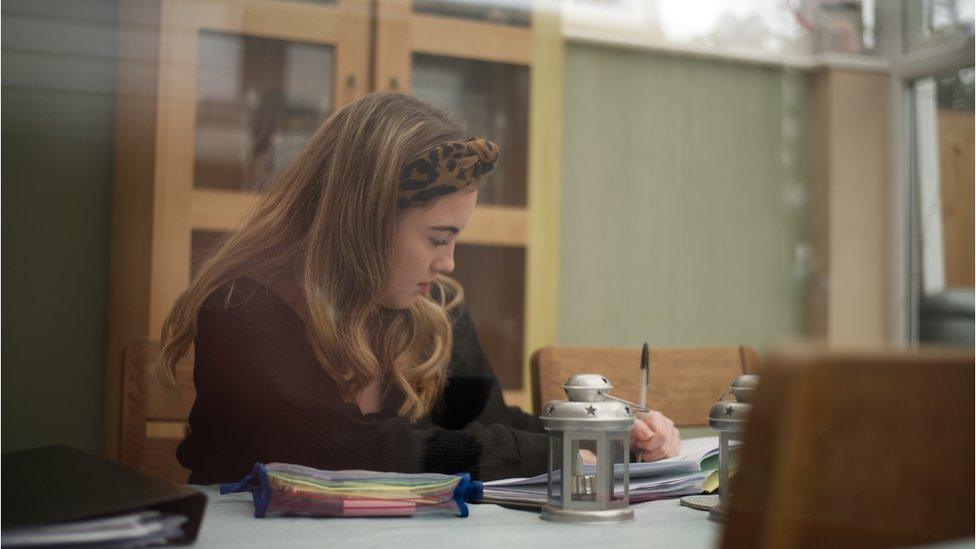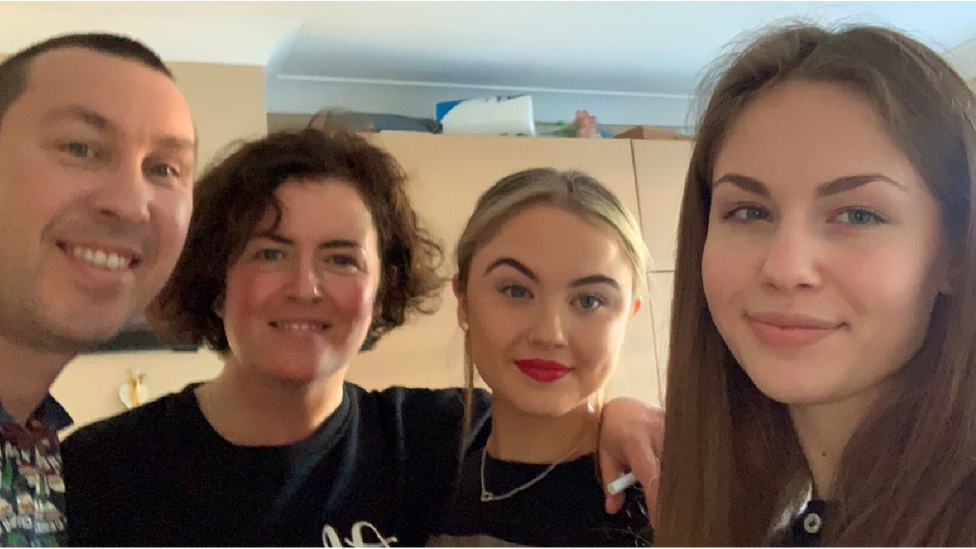Covid-19: A-level student on 'the end of normal learning'
- Published

Niamh Hodgkinson initially though the coronavirus would quickly be brought under control
With English schools closed to most pupils, young people are getting to grips with juggling assessment deadlines with remote learning. Here, 17-year-old Niamh Hodgkinson, from Colchester, tells of her experience of studying for A-levels amid the global pandemic.
To say it has been very weird time is something of an understatement.
When the coronavirus first emerged as a threat in the UK, I had been studying psychology, early modern history and English at Colchester Sixth Form College, full time for about six months.
A month later, in March, came the first lockdown and the end of normal learning.
I was really enjoying college - making friends, going out in town during lunch breaks and basically just enjoying my teenage years.
With that first lockdown, I initially though it would be for like a month and it would then all be under control.
Four months on, and we all knew that was not the case at all.
When we eventually went back to college, I thought I would just be able to get back into the gist of things.
But it has not been like that. Not at all.
Not in college and not at home.
My mother is a nurse and she works nights. My father was furloughed. While it has been great to spend more time with him, it has been really tough on us all. And, given my mum's work, I've worried about her safety and for the wellbeing of my nan.

"My mother is a nurse and she works nights. My father was furloughed," says Niamh
When the restrictions were brought in, it has made meeting up with friends and doing the things you would usually do really hard. We've all had to get used to remote learning. So what has learning been like?
The remote learning has changed hugely since the first lockdown. Initially, we would just get emails telling us what to do and what to read. There are now proper lessons in person with the teacher.

You might also be interested in:

My timetable runs like this: On Monday, I go into a college and have a full day of lessons. On Tuesdays and Wednesdays, I do remote learning. On Thursdays, I have classes in the morning and remote learning in the afternoon. And on Fridays, I have no lessons.
In practice, what that looks like is I might have an English lesson during the morning and then I would have to rush to get a bus to get home to our village, have a little lunch, and then get myself set up for my next lesson, which will be done remotely.
It has been really disorienting.

"I don't think it has been handled very well," says Niamh, about the handling of A-level examinations in England
As for what is happening with A-levels, well that has been really confusing.
We first learned that Scotland and Wales had cancelled their exams, but in England they were still going ahead.
We just didn't have a clue as to what we were going to do or how we would be able to do it and I didn't know if our safety was really being considered.
I don't think I would be prepared to do my A-levels at the moment. After all, we've only really had seven months of full time education and yet we would have been expected to sit our exams without having the time or means to study the full syllabus. We would have been at a significant disadvantage.
Then Gavin Williamson made his announcement that they were being scrapped in England and I was really happy - and relieved at first. But now I am wondering what is actually going to be happening and how are we going to be assessed. It has all been very confusing.
We now know we will be getting out teachers' grade assessments, which in turn will be based on performance in class.
I have had to be my own motivator.

Niamh (third from left) lives at home with her father, mother and sister
Usually, with school or college, you have a start time and a finish time and you have to get yourself ready and into school.
I admit that at times my motivation hasn't been quite as good as it might be. It has been a challenge at times because you have to be tough with yourself and do things when they need to be done and not put them off until later.
I've found psychology and history a lot harder to learn remotely than English. I'm one of those people who needs to be taught information for it to stay in my head. Whereas for English, I feel much more at home and very able to take on the additional reading.
I feel the college has done an amazing job in really difficult circumstances - from what they've done with organising remote learning, to ensuring everybody wears masks on site to the alternating school populations to keep the numbers in college at any one time manageable.
The students have really been taken into account by the college.
But beyond the college, in the wider system, I don't think it has been handled very well.
As for the future, I want to spend a year working as an au pair abroad. And after that, I want to join an apprenticeship to join the police force. I'm a person who tends to speak out when they feel they or other people are being treated unfairly. That's possibly why I've written this.
As told to BBC East's Laurence Cawley.

Find BBC News: East of England on Facebook, external, Instagram, external and Twitter, external. If you have a story suggestion email eastofenglandnews@bbc.co.uk